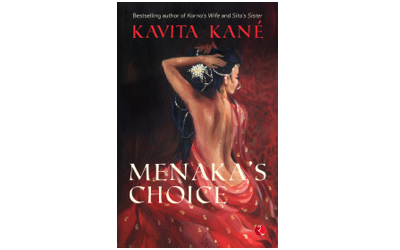Now that I recollect Menaka from the few bits and pieces of ‘authentic’ Hindu mythology I was subjected to by my grandfather, I was always told of her as Indra’s tool to break Vishwamitra’s penance. With just partial knowledge received from Doordarshan and grandfather-stories I dived into this book, and I not only gained some additional knowledge but also a new perspective. I’ve never really thought of her as a protagonist of a different story – her story – but had always considered her to be some sidekick. Because no one ever made me think about her back then. Also there was no story that highlighted any aspect of her personality leave her sensuousness, until now. Kavita Kane treats Menaka for the human that she is, and for the first time we get a narrative from the apsara‘s perspective – her fears, her dreams, her motivations all encompassing.

The lead of Kavita’s third book has dreams you’d never expect a seductress to have – of everlasting love, commitment and family. In the first half of the book we learn of Menaka’s turmoiled relationship with Gandharva King Vishwasu, and there’s an important life lesson lying here of why it’s best at times to simply let go. In the latter half of the book, we witness her seducing warrior king Kaushik, who poses threat to Indra. While we pretty much know what the conclusion to this narrative will be, it’s how it comes to become that’s really interesting.
Kavita is a master word-weaver, and this book is definitely an immersive experience to say the least. The topics the reader comes across in the book hold relevance even now. My favorite sections of the book were definitely of Menaka with Vasu and Kaushik, but I immensely enjoyed reading the parts where she was involved in a verbal battle with Indra (a character who’s depicted as a very dark person by the author). Subtle, but definitely sharp.
If you wish to indulge in mythological-fiction for your next read, Menaka’s Choice is a wonderful option.
Overall Rating: 3.5/5
You may purchase the book from here –  or from Amazon here –
or from Amazon here – 

Now that I recollect Menaka from the few bits and pieces of ‘authentic’ Hindu mythology I was subjected to by my grandfather, I was always told of her as Indra’s tool to break Vishwamitra’s penance. With just partial knowledge received from Doordarshan and grandfather-stories I dived into this book, and I not only gained some additional knowledge but also a new perspective. I’ve never really thought of her as a protagonist of a different story – her story – but had always considered her to be some sidekick. Because no one ever made me think about her back then. Also there was no story that highlighted any aspect of her personality leave her sensuousness, until now. Kavita Kane treats Menaka for the human that she is, and for the first time we get a narrative from the apsara‘s perspective – her fears, her dreams, her motivations all encompassing.
The lead of Kavita’s third book has dreams you’d never expect a seductress to have – of everlasting love, commitment and family. In the first half of the book we learn of Menaka’s turmoiled relationship with Gandharva King Vishwasu, and there’s an important life lesson lying here of why it’s best at times to simply let go. In the latter half of the book, we witness her seducing warrior king Kaushik, who poses threat to Indra. While we pretty much know what the conclusion to this narrative will be, it’s how it comes to become that’s really interesting.
Kavita is a master word-weaver, and this book is definitely an immersive experience to say the least. The topics the reader comes across in the book hold relevance even now. My favorite sections of the book were definitely of Menaka with Vasu and Kaushik, but I immensely enjoyed reading the parts where she was involved in a verbal battle with Indra (a character who’s depicted as a very dark person by the author). Subtle, but definitely sharp.
If you wish to indulge in mythological-fiction for your next read, Menaka’s Choice is a wonderful option.
Overall Rating: 3.5/5
You may purchase the book from here – or from Amazon here –
or from Amazon here – 
